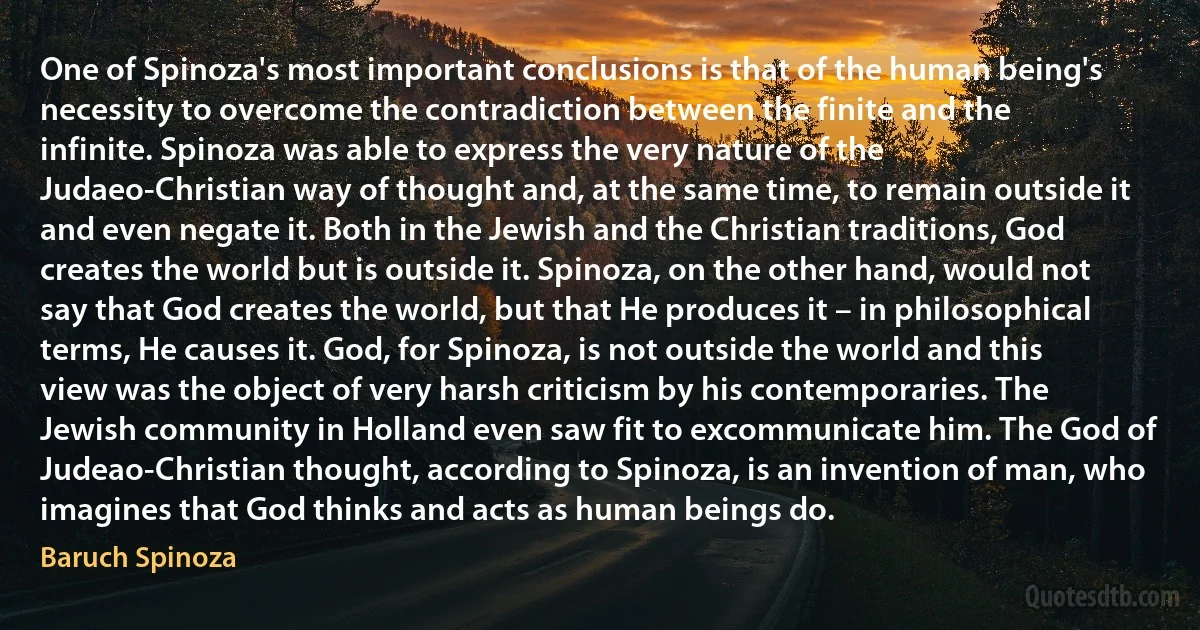
One of Spinoza's most important conclusions is that of the human being's necessity to overcome the contradiction between the finite and the infinite. Spinoza was able to express the very nature of the Judaeo-Christian way of thought and, at the same time, to remain outside it and even negate it. Both in the Jewish and the Christian traditions, God creates the world but is outside it. Spinoza, on the other hand, would not say that God creates the world, but that He produces it – in philosophical terms, He causes it. God, for Spinoza, is not outside the world and this view was the object of very harsh criticism by his contemporaries. The Jewish community in Holland even saw fit to excommunicate him. The God of Judeao-Christian thought, according to Spinoza, is an invention of man, who imagines that God thinks and acts as human beings do.
Baruch SpinozaRelated topics
able christian contemporaries contradiction criticism fit holland human imago man nature necessity outside overcome remain saw say thought time view way world ActsRelated quotes
Therefore, it is you, the giver of life and being, who seem to be sought in the different rites by different ways and are named with different names, because as you are you remain unknown and ineffable to all. For you who are infinite power are none of those things which you have created, nor can a creature grasp the concept of your infinity since there is no proportion between the finite and the infinite. But you, almighty God, who are invisible to every mind, are able to show yourself as visible to whom you will and in the way in which you can be grasped. Therefore, do not hide yourself any longer, O Lord; be merciful and show your face, and all peoples will be saved who are no longer able to forsake the source of life and its sweetness when they have had even a little foretaste of them. For no one withdraws from you unless he does not know you.

Nicholas of Cusa
What is the alternative to collective bargaining? There is none except anarchy, and there are rare elements in the country that would like to see anarchy in the trade unions-in my view the most dangerous thing for the country that could happen. Another alternative is force, but we may rule out force in this country, and I would lay it down that, so long as the industrial system remains as it is, collective bargaining is the right thing. I have no doubt about that. And yet we all know in our heart of hearts that it may be a clumsy method of settling disputes, and that the last word has not been spoken. Some day, when we are all fit for a democracy, we shall not need these aids, but certainly for my part, and as long as I can see ahead, unless there is that change in human nature which we are always hoping for, collective bargaining will be a necessity.

Stanley Baldwin
My father's moral inculcations were at all times mainly those of the "Socratici viri;" justice, temperance (to which he gave a very extended application), veracity, perseverance, readiness to encounter pain and especially labour; regard for the public good; estimation of persons according to their merits, and of things according to their intrinsic usefulness; a life of exertion in contradiction to one of self-indulgent sloth. These and other moralities he conveyed in brief sentences, uttered as occasion arose, of grave exhortation, or stern reprobation and contemp. But though direct moral teaching does much, indirect does more; and the effect my father produced on my character, did not depend solely on what he said or did with that direct object, but also, and still more, on what manner of man he was.

John Stuart Mill
The animating purpose of James was, on the other hand, primarily moral and artistic. It is expressed in his phrase, "block universe," employed as a term of adverse criticism. Mechanism and idealism were abhorrent to him because they both hold to a closed universe in which there is no room for novelty and adventure. Both sacrifice individuality and all the values, moral and aesthetic, which hang upon individuality; for according to absolute idealism, as to mechanistic materialism, the individual is simply a part determined by the whole of which he is a part. Only a philosophy of pluralism, of genuine indetermination, and of change which is real and intrinsic gives significance to individuality. It alone justifies struggle in creative activity and gives opportunity for the emergence of the genuinely new.

John Dewey
The apostle Paul ... was conscious of the new in his apprehension of the gospel over against the primitive Jewish-Christian Church, and based the right of his apostolic preaching not upon human tradition, but upon the revelation of the Spirit of Christ in his heart. ... The "Christ according to the Spirit,” as Paul preached him, was certainly not identical with the "Christ according to the flesh,” as he lived in the recollection of the Primitive Church. For Paul had stripped off the Jewish in this individual phenomenon, in order to bring forth and exalt as an object of faith to gentiles and Jews alike the universal religious principle alone. His Christ is the ideal Son of God, i. e. the personification of the religious idea as it lived in the soul of Jesus, of the love of God and men as it had been the impelling principle of his life-work.

Otto Pfleiderer
